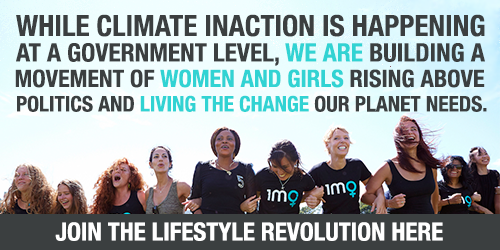We've been given a unique opportunity - to re-evaluate our approach to our cities, our health and our environment. And our approach needs to link all these things, specifically when it comes to our health and the environment. We spoke with Fiona Armstrong, the Founder and Executive Director of the Climate and Health Alliance (CAHA) to find out what that means. Fiona has written in The Conversation, appeared on the Australian Broadcasting Corporation, and we were lucky to sit down, although in different places, to discuss the connection between public health and the current pandemic. What follows, is virtually, the unedited transcript of our conversation (my questions and comments are bolded).
How are the current climate emergency and the current pandemic linked?
Yeah, so it's a really interesting question. Unfortunately, we continue to face the climate crisis, although it's less evident here, as we go into Autumn. The impacts of climate change are felt most intensely for people in Australia during the summer. We've got some brief respite here, but we've come out of a massive climate emergency in the form of the bushfires, and the smoke pollution that was generated by those bushfires and all of the kind of impacts on health that implies whether it's people losing their lives or being injured in the bushfires themselves or losing their homes and livelihoods.
I suppose this year, the bushfires and then COVID, have both been very obvious examples of the link between the destruction of our climate and the impacts on how our health are linked.
It's a massive impact on health in terms of socio-economic status as well as post-traumatic stress. And we're straight into another climate-related health crisis in the form of a pandemic. Climate change is just the symptom of the mismanagement of our planet and our home.
Right.
The fact is that we know global heating is caused by the production of greenhouse gases, but we're also concurrently using natural resources at a much faster rate than they can be replaced. So that's leading to massive deforestation and biodiversity loss, and that contributes to climate change too.
We know that the rise of zoonotic diseases - which are diseases that jump from animals to humans - is linked to habitat loss and forest destruction and logging and the encroachment of urban settlements up into areas where animals and other species live.
So we're making other species less healthy through our impact and we're coming closer to other species that have diseases and therefore those diseases are jumping more readily into humans, and that's what's happened with COVID-19. And it's very virulent in that, it spreads very quickly, and we have no immunity and in a globally connected community, it's spread very rapidly across the globe.
Do you think this is going to change people's attitudes towards addressing climate?
I certainly hope it's the wake-up call that we need and that was what colleagues and I wrote about in The Conversation recently. We described it as a war on nature. I'm not thrilled by this sort of military sort of metaphor, but our destruction of the natural environment is undermining our self-interest.
And if you're looking there's a huge amount of discussion and literature and evidence and science being generated right now to illustrate this connection. I hope that that will begin to kind of penetrate the mainstream media and broader conversation so that people do start to connect that our impact on the natural environment is leading to diseases and behaviour in terms of a carbon-intensive lifestyle is driving climate change. There's only a few solutions to that and it's really within our own ability to reduce that impact.
You mention that there are only a few solutions to climate change. Start with that. What are they?
So there are lots that people can do. Climate change is a slow-moving disaster and has very negative impacts on health. People can make a difference through the choices that we make and about the food that we eat. How we move around so the transport choices that we make and choosing active and public transport where we can or low emissions vehicles. We can make an impact through the choices that we make in terms of how we purchase our energy so installing solar if we can do that or buying 100% green energy.
One of our key messages at 1 Million Women is that people need to be making these changes day-to-day in their lives.
Those things are really important for people to do on a personal level and in their own lives and also talking to other people about what they can do because the impact of social norms on other people's behaviour can be very powerful, but we're not going to be able to reduce emissions, to the extent that we need to by every individual taking action because our emissions that are produced through industrial processes and in large sectors are huge and that's where choices need to be made and that's where government policy comes in.
So, if we don't like what government policies are doing, and at the moment in Australia, certainly at the federal level they are encouraging fossil fuels and supporting fossil fuels and helping to drive emissions up so that's in completely the wrong direction. So people must get engaged. One of the brilliant things about living in a democracy is that we can engage with decision-makers, and they have a responsibility to respond to community sentiment and the things that communities care about.
So we need to be speaking to our MP's. Any tips?
They're not going to respond if they're not hearing from their constituents about the things they're concerned about.
So I urge people to get in touch with their Member of Parliament, whether it's at the state or the or the national level. And I also encourage people to engage with their local councils because local councils are engaged in a lot of leadership around action on climate change. Some of them are declaring climate emergencies, many of them are setting targets to become carbon neutral, and they are responding directly to community sentiment around that so we need to see the same responses, the responsiveness, from state and federal governments.
So getting in touch with your MP expressing your concerns and framing it as a health concern can be an important way to bridge the political divide on this because to date health is not an issue that's been politicised in Australia, the way that climate change has very much.
Yeah, that's something we're encouraging. Are there any other topics you want to touch on?
We just need to talk about it. The impacts on health and how the strategies to reduce emissions can also improve our health and well being in ways that, you know, deliver a triple benefit, they reduce emissions they improve their health, and they save us money because what we know from, you know, examples overseas and also the scientific modelling that strategies to reduce emissions, deliver health gains. The economic value of those health gains is often worth, many times the cost of the policy. So, implementing stronger air pollution standards, implementing a carbon price would deliver health and, and well-being benefits that vastly outweigh the cost of implementing the policy.
We've certainly tried a carbon tax in Australia before.
We have and we need to do it again. We need to make sure that our policies create a financial disincentive and that they drive investment in the good things that we need clean renewable energy electric transport, you know, healthy and energy-efficient buildings, and so on.
Money is just such an important incentive. It is the way things move forwards and backwards.
Yes. And as we've seen with the COVID pandemic and government responses to it around the world, there is money available to respond when we need to. So, it's simply not true to say that we don't have the money that we need to invest in climate action because we know that not acting will cost us much more we're already seeing trillions of dollars in damages around the world. Already, and that's only going to increase if we fail to limit global warming. So, our only path forward is to invest in climate action. If we want, you know, a secure economy.
You can follow CAHA's work here. Have you been wanting to message your MP? They've got you covered here.


